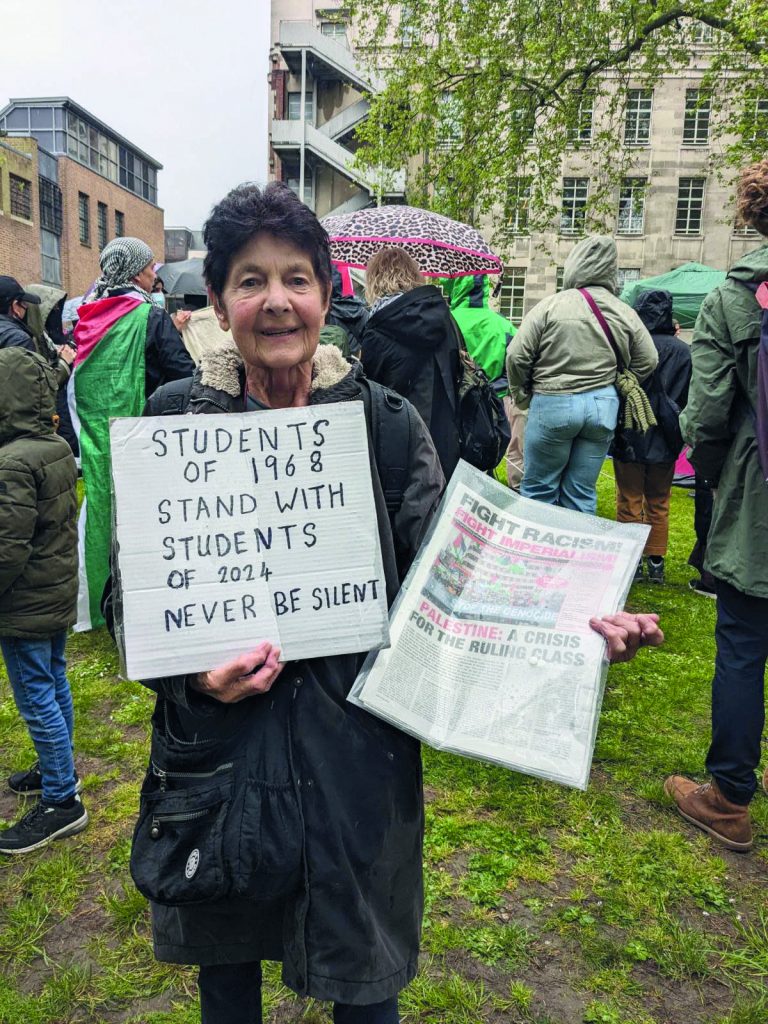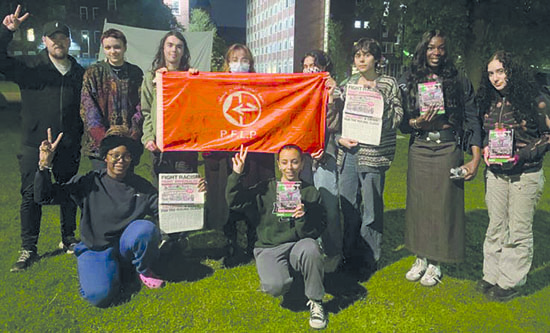In mid-April, students in universities across the US set up encampments on university grounds demanding total divestment from Israeli companies and the severing of academic ties to Israeli institutions. The first university encampment was set up by Columbia University (New York) students on 17 April 2024, shortly followed by similar protests in 130 college and university campuses in 45 US states. With no opportunist forces to control the movement from within, the state response was immediate and violent: almost 3,000 arrests, security and police forces in riot gear dragging students across the ground, pepper spraying them, tasering them and storming their university buildings with guns. Zionists thugs were allowed free rein to act as auxiliaries of the state and terrorise and attack encampments while police looked on. University administrations collaborated with police and several organisers face expulsion. Though the majority of the encampments have now been destroyed, they have succeeded in raising consciousness around the onslaught on Gaza and have inspired students at universities across Australia, Britain and Europe to set up similar encampments, many of which are ongoing as we go to press. REAGAN GRAY and RIA AIBHILIN report.
US students have been protesting against their universities’ support for Israel’s genocidal attack on the Palestinian people since the latest onslaught began in October 2023, and at the same time university administrations have been working at the behest of the US state to censor any support for Palestine. On 5 December 2023, the United States House Committee on Education and the Workforce held a hearing on anti-Semitism on college campuses, a witch hunt to conflate anti-Semitism and anti-Zionism so that any criticism of Israel is deemed de facto anti-Semitic. Presidents of Harvard, the University of Pennsylvania (UPenn) and the Massachusetts Institute of Technology were grilled for hours over what steps they were taking to combat anti-Semitism on campus. Republican congresswoman Elise Stefanik was able to conflate ‘intifada’ with ‘the genocide of Jews’.
University administrations across the US have capitulated to this weaponisation of anti-Semitism, setting up anti-Semitism taskforces and cracking down on Palestinian solidarity. UPenn President Liz Magill was forced to resign days after the House hearing for her ‘evasive’ answers to some of the questions, and Harvard President Claudine Gay followed a few weeks later. On 17 April 2024 another House hearing was taking place – this time with the President of Columbia University, Minouche Shafik. As Shafik was conceding to the premise that there is rampant anti-Semitism on campus (evidence including use of the chant ‘from the river to the sea’), and promised to fire at least one professor from his leadership position, Columbia university students were setting up camp on their campus lawn. They promised to stay there until their demands were met: that the university divest from companies that ‘profit from Israeli apartheid, genocide and occupation in Palestine’; sever academic ties with Israeli universities and end research collaborations; support housing for low-income students; end the repression of Palestinian solidarity and sever all ties with the NYPD; call for an immediate, permanent ceasefire and call on government officials to do so too.
More than 100 students occupied the lawn for over 30 hours, before Shafik authorised the NYPD to clear the encampment. Over 100 students were arrested, facing disciplinary action from the university. However, this initial crackdown and police repression only emboldened the student movement both at Columbia University and across the country. In the days following, another encampment at Columbia was set up and encampments went up in campus after campus, with similar demands for their universities to sever all ties with Israel. Displaced Palestinians in Gaza expressed gratitude for the protests, writing signs and painting tents. As solidarity encampments cropped up across the country, militarised police forces were deployed by nearly every university administration to repress the protesters.
The situation escalated even further on 24 April, when the Columbia university authorities threatened to send in the National Guard. This was a brazen threat of violence against the protesting students, invoking memories of the mass murder that took place when the National Guard was sent into Kent State university in 1970.
Kent State massacre
In April 1970 then-President Nixon announced he was expanding the war on Vietnam into Cambodia and on 29 April US forces invaded Cambodia. Protests exploded on US university campuses. On 1 May students in universities and high schools across the US participated in mass walk-outs in opposition to the Cambodia Campaign.
At a follow-up protest at Kent State university on 4 May, the National Guard, in collaboration with university authorities, began attempting to disperse the protest, first firing tear gas canisters from grenade launchers and when this failed sending in 96 National Guard troops to advance on protesters. A chase ensued, with the guards driving the protest back off the campus, before getting themselves stuck at a dead end where the protesters managed to sustain their position.
29 guards then opened fire on the students, using an estimated 67 rounds of ammunition. There was no order to fire and no guard requested permission to do so. There was no warning given to the students before they opened fire. The guards shot indiscriminately. As students pulled one of their shot classmates behind a car, the guards pelted it with bullets. Nine students were injured, including one who would be left permanently paralysed, and four were murdered. They were aged 19 and 20.
State repression
The latest threat to send in the National Guard garnered nationwide attention and condemnation. Hundreds of people turned up to the Columbia encampment in solidarity, and still more encampments went up in other universities. Following the crackdown on Columbia, California State Polytechnic University, Humboldt, became the first to occupy a university building. Immediately riot police with batons arrived on campus. Maxwell Schnures, chair of the department of communication ‘said the university has seen numerous occupations in his almost 20 years there, and never have administrators and police had such an aggressive response’ (The Guardian, 12 May).
Other examples of violent repression included:
- On the morning of 25 April at Emory University in Atlanta, Georgia, police released tear gas, and started violently arresting members of the encampment. A video circulated of police repeatedly tasering a young protester after they were handcuffed and restrained on the ground.
- On 26 April, Indiana University positioned state troopers with snipers on the rooftops overlooking the student protests as more police, armed and suited with riot gear, violently arrested over 50 peaceful student protesters for standing their ground and refusing to leave the encampment area.
- University of Texas, Austin deployed police on 29 April in response to a Palestine Solidarity Campaign post calling for a six-hour occupation and teach-in of the central campus lawn. Before students could even fully assemble for the demonstration, police descended and violently arrested nearly 80 student protesters, using flash bangs and pepper spray to break up and apprehend members of the crowd.
- At University of California Los Angeles (UCLA), the LAPD let a mob of vigilante Zionists do their dirty work for them by allowing them to violently attack the student encampment on the night of 30 April. For hours, the pro-Israeli mob terrorised the UCLA students, tearing through barricades, shouting racial slurs, spraying students with pepper spray and eventually launching explosive fireworks into the encampments. This violence continued for hours. Videos show a member of the UCLA student encampment at one point being shoved to the ground where the mob descended on him, kicking and beating him with poles until he could be pulled back into the encampment to receive medical treatment. After four hours of chaos, police arrived on the scene, not to protect any students from the direct threat of the Zionist agitators, but to disperse the encampment and arrest, en masse, the pro-Palestine student protesters. 25 members of the encampment were hospitalised from the injuries sustained by the Zionist mob as well as riot batons and rubber bullets fired by LA police. By the morning of 1 May hundreds of student protesters had been arrested and the encampment destroyed.
On 2 May, US President Joe Biden made an official public statement on the matter, denouncing the nature of the protests, alluding to the demonstrations as disruptive, non-peaceful, and anti-Semitic.
Opportunist forces
The exemplary actions of the students in the US saw them refuse to water down their demands or capitulate to threats of exclusion, violence and arrests. Although the left-Democrat Alexandria Ocasio-Cortez was eventually sent in to be the friendly face to protesters, opportunist forces do not have control over protest movements in the US in the same way they do in Britain. The development of the labour aristocracy in the oldest imperialist country, Britain, is deeply entrenched. Its political representatives in the official solidarity groups, trade union leadership and the Labour Party are able to play a mediating role between working class anger and the needs of the ruling class, encouraging the use of respectable tactics that will not disrupt the maintenance of capitalism. In the US this layer is not as deeply entrenched nor as well organised, so antagonisms between classes are given expression through more immediate and direct class conflict.
The violence used by state forces against the protesters exemplifies the potential of the Palestinian struggle to cause a major political crisis for the US ruling class. Student protesters were broadening their demands to make links between US imperialism abroad and poverty, racism and repression at home. The US imperialist state spends billions of dollars each year propping up its Zionist attack dog and needs Israel to exist to guard its interests in the Middle East. Protests for total divestment from, and the complete isolation of, Israel strike the belly of US imperialism and the ruling class could take no chances, doubling down to repress them.
Student uprisings rippling across Australia, Europe and Britain
Inspired by the student protests in the US, on 23 April students at University of Sydney, Australia, set up their Liberated Zone to demand the university disclose the investments of the endowment funds and to divest from all of the 97 companies and business that have ties to Israel’s occupation and genocide of Palestine. In the subsequent days, Palestine solidarity encampments have been established at over ten Australian universities across Melbourne, Ade-laide, and Perth. Up until now, these universities have not yet seen the level of police intervention used in the US, but on 17 May many university administrations suddenly moved to crack down on student protestors, with at least two issuing eviction notices to the student encampments. The President of the University of Melbourne has called for police mobilisation against the students. This comes alongside a scathing admonishment of the encampments by the Labour Prime Minister Anthony Albanese, who has labelled the protests hateful and ignorant.
Police repression has been more prevalent in student solidarity encampments in Europe. On 6 May police violently arrested 169 people while breaking up the student encampment at the University of Amsterdam. Similar scenes played out at Sorbonne University in Paris, and at the University of Berlin.
Warwick University was the first student encampment in Britain, commencing on 26 April. In the following weeks, 30 more British universities established encampments including Bristol, Sheffield, Leeds, Manchester, Newcastle, Oxford, Cambridge, UCL and SOAS, all demanding the universities disclose, divest, and cut ties with companies such as Barclays. These demands have thus far been largely ignored by the administrations, although on 23 May – in a major escalation – police were unleashed on students at Oxford university and 16 protesters were arrested.
As communists living in imperialist countries, it is our duty to strike and weaken our ruling classes and to raise political consciousness. This is what the US student uprisings began to do.

FIGHT RACISM! FIGHT IMPERIALISM! 300 June/July 2024




